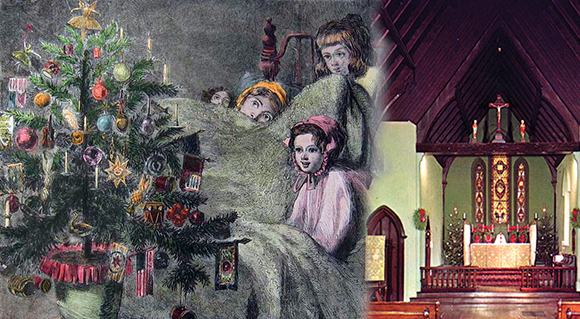Christmas was a joyfully religious experience for the many old German families who lived in Maspeth Village at the turn of the 20th century. In the front parlor of the tidy houses where fires were lighted only on Sunday to conserve fuel, the fragrant evergreens stood. Lovingly decorated with pastel colored paper trims and sugar candies bought from the butcher or the candy shop and lighted by tiny candles set in scalloped tin rosettes and clipped to each branch, the Christmas tree was beautiful. When the candles were lighted, the tree was carefully tended and no one ever heard of a fire in Maspeth caused by Christmas tree candles.
Eva’s family went through the knee-high snow to St. Saviour’s Church on Christmas morning. The altar was decorated with two lovely Christmas Trees tended by two men with long sticks, the ends of which were wrapped with wet cloths to quickly douse any guttering candle, and the walls of the church were hung with beautiful green wreaths.
After the wonderful story of the first Christmas was retold and the service was over, the children of the Sunday School received their gifts from the church. Each child would be given a box of candy and an orange; the boys would also get a toy that wound up or a book and the girls would each receive a doll. The church ladies would have dressed each doll in long clothes, in the old fashioned way, and hung it up in a row with each girl’s name on each one. The dolls were so beautiful that they moved even the boys to envy. Eva’s little brother felt spited and often poked the eyes out of Eva’s dolls!
There was caroling at church, and the choir sang wonderfully well with many voices. The Theiss brothers were choir members; they had the ornamental iron works on Broad Street, now 59th Street.
Dinner on Christmas was usually a chicken, taken from the yard. Sometimes there was a turkey, but not often because while Eva’s dad was a successful barber on Maspeth Avenue, the family wasn’t wealthy. The children took great care of their toys because there was no money to buy new ones if they were broken. In those days, children shared the work at home.
After Christmas, Ladies Day on January 2 was very popular with the German people. All the ladies would bake homemade cake and, in their most beautifully crocheted and embroidered aprons, would await the visits of their neighbors. They went from house to house exchanging greetings, taking a cup of coffee or a tiny glass of wine and spent the day paying and receiving calls. At night, Eva’s mother would take a lantern, light it and lead her guests down to the main road to get the trolley.
The paying of calls on Christmas and New Year’s is an all-but-forgotten custom, but a neighborly one. This season, let’s finish dinner early and instead of the “long winter’s nap,” let’s remember our neighbors with a short visit to let them know that the Spirit of Christmas is in our hearts and we want to share our pleasure with them. Merry Christmas!



